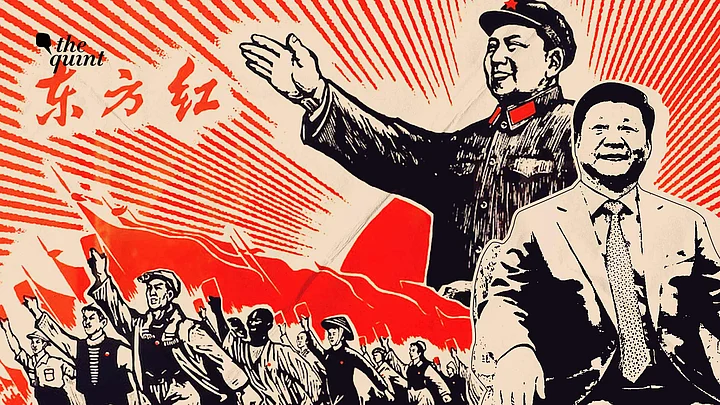Nothing can stop Xi Jinping—not the COVID-19 pandemic, not crumbling coteries, and not even capitalist powers' ostensible isolation. As Xi embarks on the historic third term as the president of China, his trusted man Li Qiang becomes the new premier. Xi is already the head of the Chinese Communist Party(CCP) and the People's Liberation Army.
Former Vice Premier Han Zheng has been elected as China's vice president while the top man of the CCP's anti-corruption commission—Zhao Leji— becomes the new parliamentary chair. All these men are Xi's confidantes.
Photographed as brandishing his right fist, while putting the left palm over China's constitution after the 10 March parliamentary announcement, Xi means business.
But what does it mean for India and the world?
What Next for India-China Relations?
In the recently concluded conclaves of finance and foreign ministers of the G20 nations in Bangalore and New Delhi respectively, China played a vital role in blocking the releases of joint communique. India's G20 presidency, thus, has already started on an insipid note. Despite Prime Minister Narendra Modi's inaugural appeal to the foreign ministers, shared concerns were trumped by the fastidiousness of the Russia-China bloc.
Xi's third presidential term will bear this albatross of sabotage—not that Beijing is any ancient mariner. New Delhi will continue to smart under this sleight of hand at least until the G20 Summit later this year.
Despite S Jaishankar's acknowledgement of China's economic might acting as a deterrent to India's escalation on border issues, there are no signs that Beijing will stop seeing New Delhi as an eyesore in Asia.
Can the continuity facilitated by Xi Jinping's third term and PM Modi's likely return to office in 2024 smoothen the creases of crisis crossing the Line of Actual Control? Only the sways of global economics can divine and define this.
Xi Jinping's Dream for China
In 2013, when Xi Jinping took over as the new president after being elected by the CCP's 18th Party Congress, he used the word "dream" (meng) while making his inaugural policy speech. This should have alerted the world, for the Chinese policymakers before Xi did not believe in "dream"—toiling away to glory was the Party ethos for citizens and dreams were treated as a capitalist mirage. Xi changed that with just one word. Chinese people began to dream.
When Xi began his first presidential term people had already begun to lose trust in the CCP, thanks to corruption, infighting, and the lack of a well defined ideology. Chinese economy's impressive growth spurt did not translate into the country's geopolitical heft. Xi had his work cut out and he started swift and steady.
His foreign and domestic policies were mounted on consolidating personal power by eliminating political opposition, founding new institutions at home and abroad. He was eager to legitimise his leadership. China's aggressive investments across the world fuelled its foreign policy.
Fast forward to 2023, like everyone else in the post-pandemic world, Xi has had to limit the scope of his "dream": the latest growth goal of “around 5%” is one of China's lowest in decades.
China's Rise As A Global Power to be Feared
Xi Jinping regime's questionable treatment of wealth creators who 'dream' to become bigger than the Party—think mysterious disappearances of Jack Ma of Alibaba, Bao Fan of China Renaissance Holdings, Guo Guangchang of Fosun, and many others—may not be the best optics. Nor are the reports of hostile takeovers of infrastructure in debt-ridden countries.
Xi does not seem to care. He knows that socio-political sentimentalism may earn him praise in op-eds carried in the Western press, it does not fuel supply chains.
The latest truce between Saudi Arabia and Iran has come as a 'coronation' present for Xi. Brokered by Beijing, this restoration of ties has come at a time when the global community stares at a violent impasse in Russia-Ukraine conflict.
What the US and the rest of the West cannot accomplish is slowly becoming China's chance. And that, perhaps, is why New Delhi's competitive stance as a tall regional player that can broker peace between Moscow and Kiev is not something Xi's Beijing can be happy or complacent about.
Ratcheting of more border-related issues, reaction to the quad activities, upping the ante in Tibet, blocking of Indian proposals in the UN, and other such sabre-rattling acts can be expected during Xi's third term while he continues to pose as a responsible neighbour and trade partner. Secure at home front now, his focus is likely to be narrowed on earning unquestioning global allies and subjugating the troublemakers.
Taiwan and Hong Kong may have more pressing reasons to worry but it's India that literally stands in the line of fire.
(At The Quint, we question everything. Play an active role in shaping our journalism by becoming a member today.)
